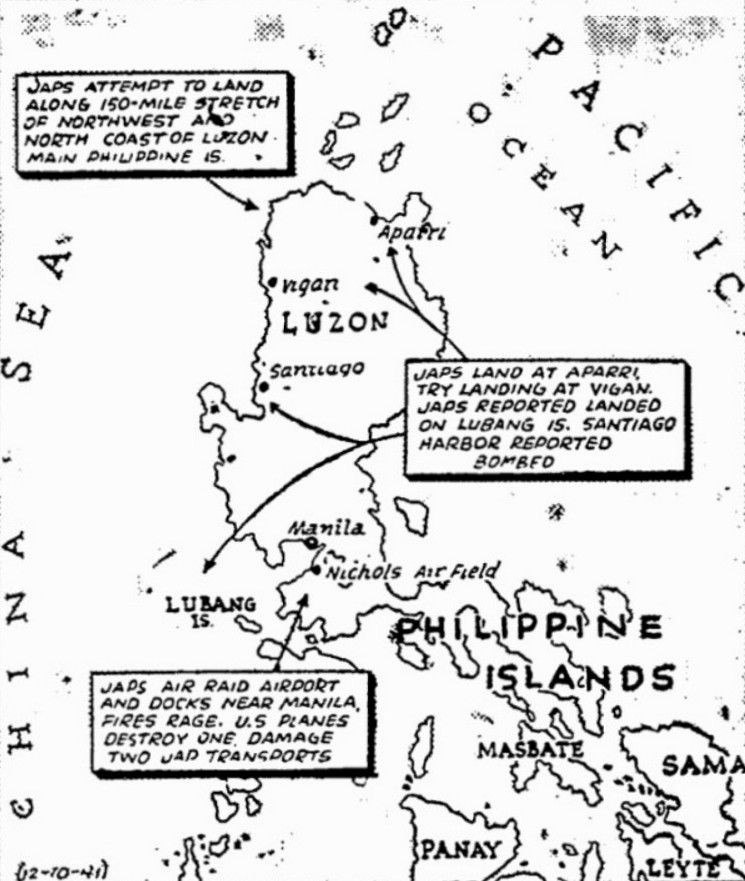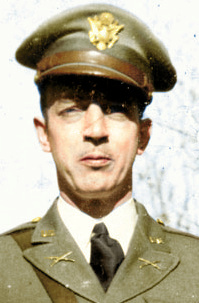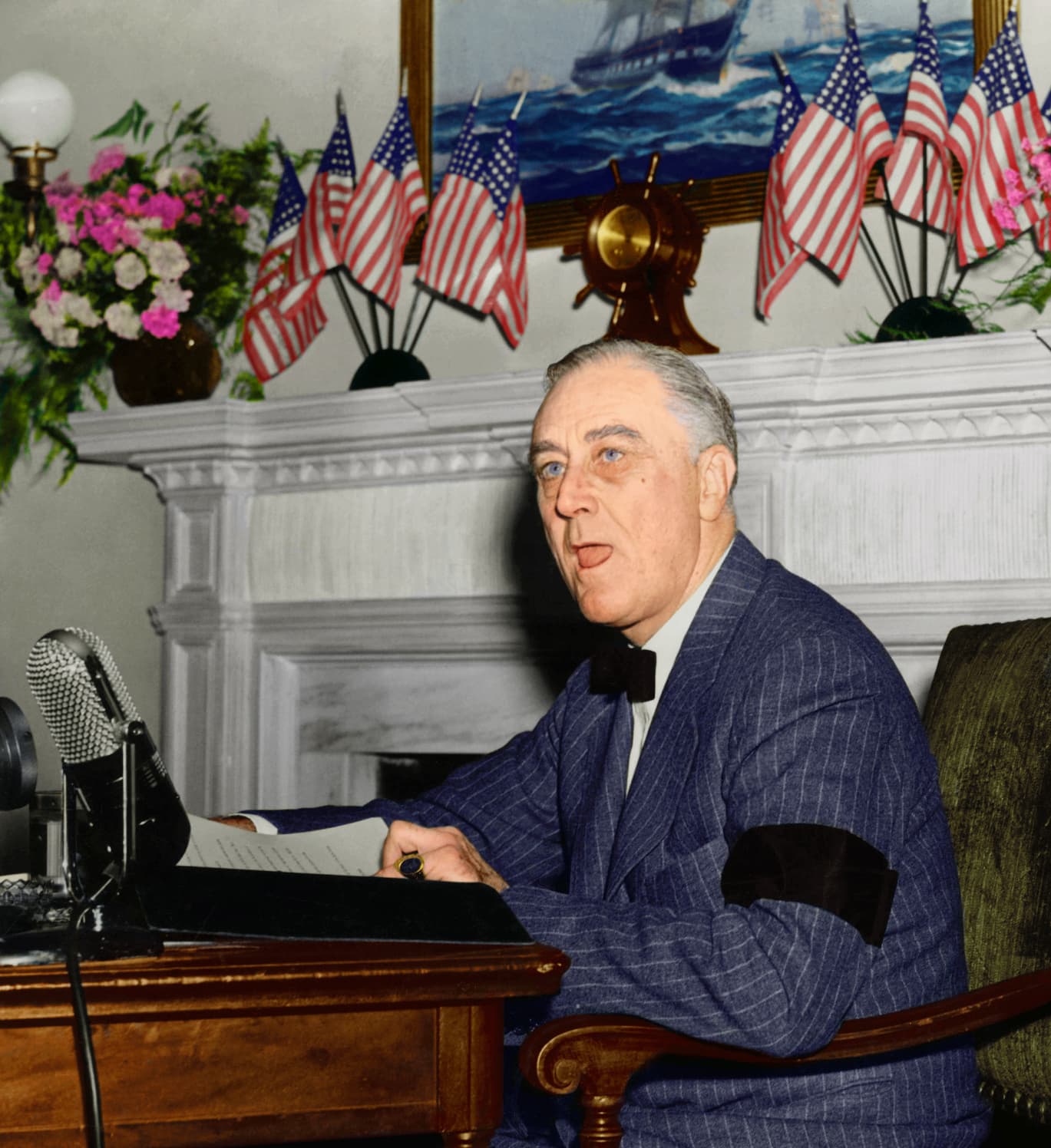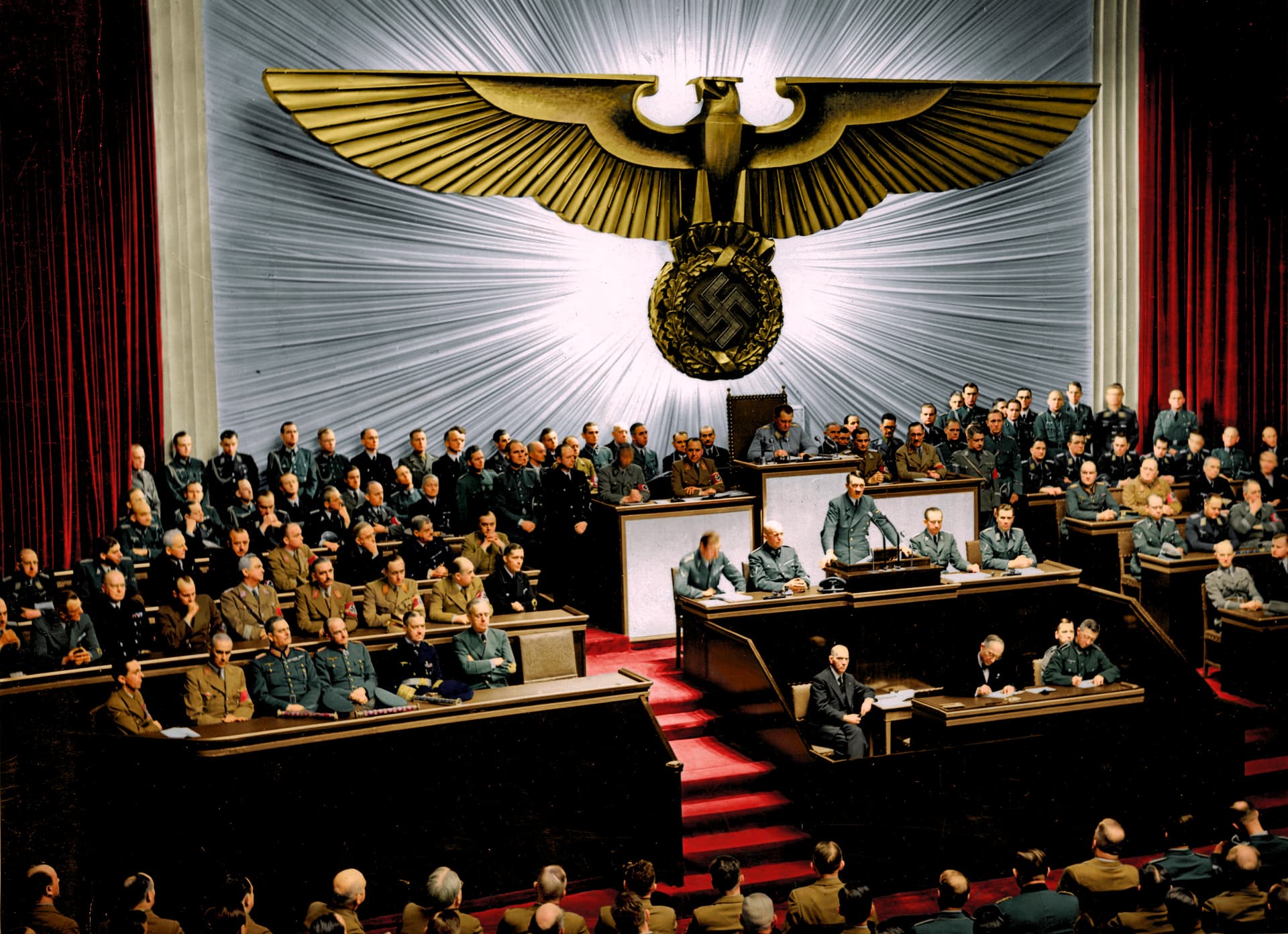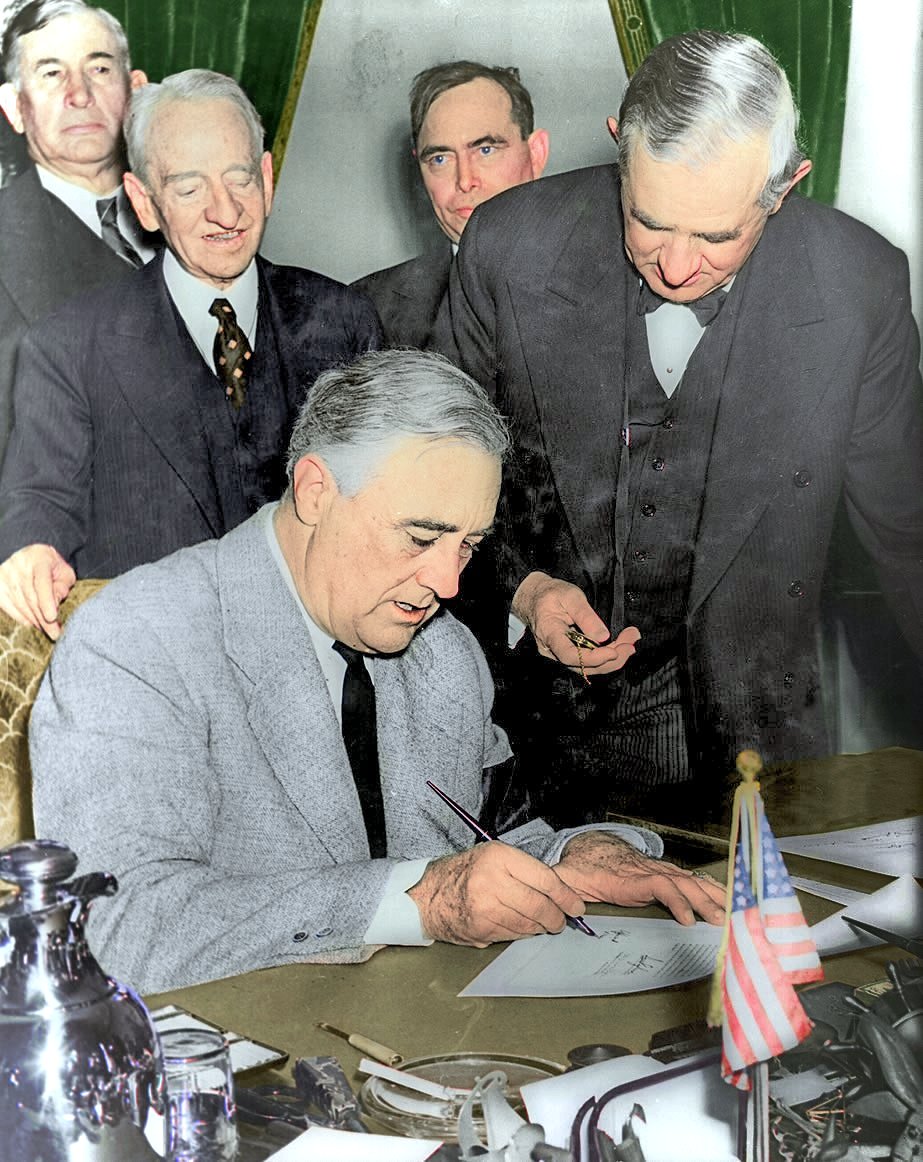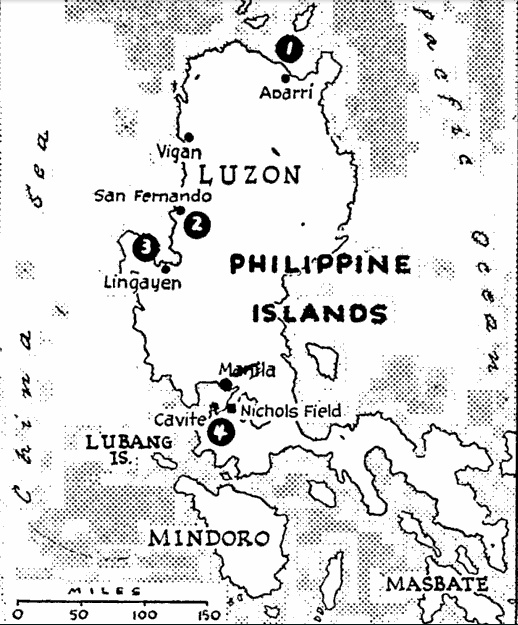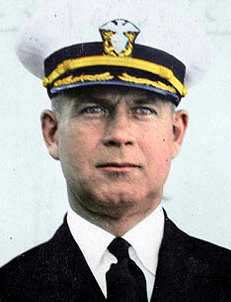Developments in other main war sectors:
SINGAPORE: London acknowledged that the 35,000-ton battleship HMS Prince of Wales and the 32,000-ton battlecruiser HMS Repulse had been sunk, apparently by Japanese air attacks off the east coast of Malaya where the Japanese battled to make a second landing only 200 miles north of the Singapore naval base. Fighting continued on the coast of northeast Malaya near Kota Bharu airdrome. German dispatches, which appeared to be deliberately distorted, said Tokyo also claimed the “almost certain” sinking of the British battleship HMS King George V. Late dispatches from Singapore hinted that the Japanese had taken Kota Bharu, but said Imperial forces reorganized south of that point and that lines were unbroken elsewhere.
TOKYO: An official news agency broadcast quoted the government spokesman as acknowledging the loss of two transports and damage to two others. The loss of 13 Army planes was also admitted, but the spokesman claimed that Japan had “smashed the main force” of the U.S. fleet.
MELBOURNE: Japanese again bombed the island of Nauru, northeast of Australia.
BERLIN: German sources claimed that “the greatest naval battle in history” was in progress in the Pacific Ocean.
Destruction of the HMS Prince of Wales and the HMS Repulse, following closely upon the heavy damage to the U.S. Pacific Fleet inflicted at Pearl Harbor appeared to have forced Anglo-American naval power onto the defensive in the Western Pacific at least for the time being.
HMS Prince of Wales, newest dreadnaught in the Royal Navy, and HMS Repulse, an old but battle-proud warship, had only arrived at Britain’s eastern sea bastion of Singapore within the last 10 days.
London admitted that their loss was the heaviest single blow of the war, a naval blow only equaled by that suffered by the American Navy at Pearl Harbor. American capital losses at Pearl Harbor thus far have been officially placed by Washington at one “old” battleship but unofficial indications are strong that other American dreadnaughts suffered damage which put them out of action for varying periods.
For the moment, the loss of the Wales and Repulse was chalked up as another victory of air over sea power. The Japanese attributed the sinkings to attacks by their bombing planes. London admitted that it had no details on the action beyond those supplied by Tokyo.
The accuracy of the Tokyo communiques is yet to be tested. A possibility, at least, exists that Germany has sent her powerful battleship, Tirpitz, sister ship of the ill-fated Bismarck, into the Far East to reinforce the Japanese battle fleet.
Bismarck was rated as only a 35,000-ton battleship but her performance in a running battle with virtually the entire British Atlantic sea forces led British observers to believe that she actually was a much more formidable opponent, possibly weighing up to 50,000 tons.
Bismarck sank Hood
Bismarck sank the great 42,000-ton HMS Hood and scored hits on Prince of Wales before herself going down under a coordinated attack of naval rifles, bombs and torpedoes. Her sister ship Tirpitz is probably capable of giving an equally imposing account. Rumors that Tirpitz has been sent to the Pacific have been general for several weeks.
The Japanese attack on the Philippines rapidly was developing into a full-scale assault.
Lt. Gen. Douglas MacArthur, chief of U.S. armed forces in the Far East, reported that Japanese transports appeared off the coast of the main island of Luzon along a 150-mile stretch of the north and northwest coasts.
Six transports attacked
The Japanese were in unknown strength. One group of about six transports was heavily attacked by American bombers. One transport was sunk and at least two others hit as they moved into the coast for a landing. The landing operations were in progress from Aparri on the north coast – scene of several Japanese air attacks – to Vigan on the northwest coast.
Simultaneously Japanese planes roared over the Manila area in a series of heavy attacks.
The first Japanese bombing flight comprised 31 planes. They attacked Cavite, the U.S. naval base near Manila. The second wave included 26 planes. Hardly had they vanished when a third wave appeared.
Center on airfields
As previously, the Japanese centered their bombing on such objectives as Nichols Air Field, adjacent to Manila. Gen. McArthur said strong Japanese bombing attacks have been made on Clark Field, the big Army air station near Baguio.
Gen. MacArthur would not comment on rumors of U.S. air attacks on such objectives as Tokyo, Kobe and Formosa, the island northwest of the Philippines on which many of the Japanese air squadrons presumably are based.
The Japanese Imperial Command claimed that, in addition to landings in the Philippines, land troops were sent ashore at dawn today on the island of Guam. The Japanese also claimed the sinking of a U.S. submarine off northern New Guinea and of a 15,000-ton Army transport off Manila.
The Japanese also circulated a rumor that they “may” have sunk the aircraft carrier USS Enterprise off Hawaii. They denied the loss of any Japanese naval vessel.
Reinforcements at Singapore
Air reinforcements were rushed to Singapore from the Dutch East Indies and the Chinese Army was said to have started a powerful offensive toward Canton, obviously with a view to relieving pressure on the British at Hongkong. The British garrison at Hongkong was engaged more and more heavily by Japanese attacking the mainland Kowloon area but still seemed to be holding its own.
The Axis stand in the Pacific was expected to be made clear before the day is over.
American correspondents in Berlin were barred from an official press conference today and ordered to “return to your apartments.” The Germans said they took the action because of the arrest of German correspondents in the United States. The action seemed to indicate that the state of semi-war between the United States and Germany soon would turn into outright hostilities.
Radio Rome said President Roosevelt’s address last night would cause the Axis tripartite pact to function, in other words that Germany and Italy will make a formal war declaration against the United States.
British take key point
On the other two war fronts, the British and the Russians scored important successes.
The British captured El Adem in Libya. This was the chief Nazi forward base of operations in Eastern Libya. Its capture would seem to presage a general retirement of German Gen. Erwin Rommel back to the Derna line. It also was thought by the British to lift the siege of Tobruk – provided it can be held. El Adem was the western hinge of the siege lines around Tobruk.
The Russians recaptured Tikhvin, key point on the Leningrad-Vologda Railroad. The success confirmed indications that along most of the front the initiative is passing to the Russians with the German announcement that they have ceased offensive operations for the winter.
U.S.-JAP BATTLE ON LUZON
Planes score hits on three invading ships
Nipponese troops gain foothold on north coast, Manila reports
Where Japanese invasion was thwarted
Today’s “hot spots” in the Philippines are shown above. While invading troops were reported to have landed on a 150-mile front on the north coast of Luzon, an invasion attempt on the west coast south of Vigan was repulsed by the U.S. Army.
WASHINGTON (UP) – War Department Communique No. 1 of the U.S.-Japanese war announced today that U.S. Army and Navy forces had repulsed a Japanese landing attempt on the island of Luzon in the Philippines. This is the main island on which Manila is situated.
The communique was the first to be issued by the War Department and was based on a report last night from Lt. Gen. Douglas A. MacArthur, chief of the U.S. Army Far East Command.
News dispatches directly from Manila today related, however, that new Japanese landings were in progress on a 150-mile stretch of the northwest and northern coasts of Luzon.
The communique announced that Army and Navy bombers had scored direct hits on three Japanese ships and that three other ships were also damaged. One ship capsized and sank immediately, the communique said.
Southern group safe
The communique stated that, thus far, there had been no Japanese attacks on the southern groups of islands of the archipelago.
The text of the communique:
“Information received last night from the Commanding General, Far East Command, reveals the defeat of a hostile attack against the west coast of Luzon between San Fernando and Vigan.
“Our first bombing attacks on six transports at Vigan resulted in direct hits on three hostile ships and damage to the remaining three, one ship capsizing and sinking immediately.
“The Navy air force participated in the attack in close cooperation with the Army. No operations have as yet materialized in the southern islands.”
The communique did not reveal the size of the Japanese forces that attempted the landing.
The scene of the fighting is not far from the Japanese island of Formosa. It is likely that the forces may have embarked from there, although no hint was given in the communiques.
Japanese claims offset
The fact that the communique said there were no operations reported in the southern Philippine Islands was taken as an offset to the Japanese claims that operations are underway at Davao.
The communique was issued directly by the War Department to waiting newspapermen in the Army offices, instead of being released through the White House, which has handled war news previously.
White House Secretary Stephen T. Early said that henceforth the War and Navy Departments would handle most of the news about their operations.
Hewlett: Japs strike again on northern coast
By Frank Hewlett, United Press staff writer
MANILA, Philippines (UP) – A Japanese expeditionary force today fought through a rain of American bombs to consolidate a foothold on the coast of Luzon Island for an invasion of the Philippines.
American bombers rained high explosives on Japanese landing transports, sinking or damaging at least three. The Japanese Air Force countered by sending flight after flight of silver-colored bombers high over Manila to attack key U.S. air and naval bases around the capital.
Tokyo claimed Japanese forces also landed on Guam this morning. The Japanese landings in Guam and Luzon were the first invasion of American soil by sea since the British landings in the War of 1812.
Japanese landing operations were being attempted along a 150-mile stretch of Luzon’s northwest and north coasts. Japanese forces were ashore at Aparri on the north coast.
By mid-day, Manila had passed through four air attacks, centering, as have all previous attacks, on Army, Navy, and Air Force objectives.
A United Press correspondent counted at least 57 Japanese planes apparently passing over Manila at altitudes of from 12,000 to 15,000 feet.
Two Japanese bombers and one Japanese fighter plane were reported brought down.
Perfect formation
The Japanese planes flew over Manila in perfect formation, their silver wings blending with the sky. The city proper escaped damage but what were described as “a few costly blows” were scored by the Japanese attackers on American military objectives.
U.S. anti-aircraft guns hammered away at the attackers but this correspondent, watching the raids from the eight-story Wilson Building in the heart of the city, saw no bombers fall. The planes were flying at about 15,000 feet and it appeared that the anti-aircraft fire was falling short.
Airfield hit again
The Japanese again bombed Nichols Airfield, the Army base on the outskirts of Manila. Flames and heavy black smoke were seen in the vicinity of the air base. Another fire was seen a few miles east of the Navy’s powerful Cavite base. One fire started in the Cavite area but burned only a few minutes.
One Japanese plane and possibly more was downed at Pasay on Manila’s southern outskirts and another in Tondo, a poor section of the city. A Japanese fighter was brought down over Quezon City, reportedly by a Filipino fighter pilot.
Evacuation ordered
American officials said that because of attacks on the Nichols Field area, it had been decided to evacuate the Paranaque district, adjoining the air base. About 10,000 persons live in Paranaque.
The Japanese have succeeded in landing a number of men, at Aparri on the north coast and possibly at other points in the area, it was announced, and are seeking to land men at Vigan on the northwest coast.
Official statement
Army spokesman Maj. LeGrande A. Diller made the announcement in a statement which he asked correspondents to transmit without elaboration or interpretation.
“The enemy is in heavy force off the north coast of Luzon from Vigan to Aparri,” it said.
“Large Japanese naval elements are escorting transports with Japanese air support at Vigan.
“At about 7:30 a.m. [6:30 p.m. Tuesday EST], six transports were engaged in landing operations.
“At that time, our bombing attack on these ships created grave damage. Three transports were directly hit, one immediately capsizing. Bombs were observed hitting close to the other three.
“At Aparri and perhaps other contiguous points, landings were effected, but the exact strengths are unknown.”
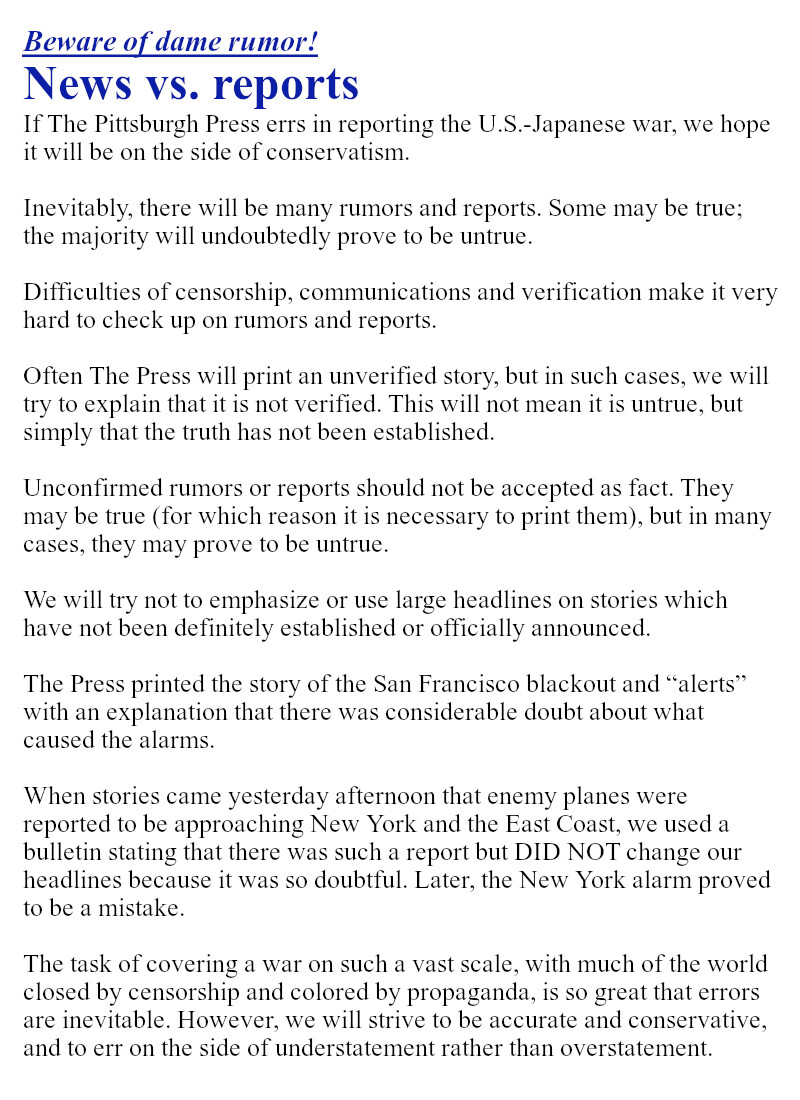
WAR BULLETINS!
Nazis report sinking of HMS King George V
BERLIN, Germany – The official news agency said in a Tokyo dispatch today that it was “almost certain” that Britain’s new 35,000-ton battleship HMS King George V had been sunk.
The official German agency report was received with considerable skepticism because the battleship is the same type as HMS Prince of Wales, which London acknowledged had been sunk off Malaya. It was suggested that the German dispatch had confused the two vessels, perhaps deliberately. There had been no indication that the King George was in the Far East. Official sources in London refused to comment.
U.S. supply lines cut, Japs say
SAN FRANCISCO – A Japanese government broadcast heard by a United Press listening post here today claimed that the Japanese blitzkrieg attack in the Pacific had cut U.S. supply routes to Asia and said “Japan is now prepared to concentrate on her co-prosperity sphere in East Asia.”
Japs held near Singapore
SINGAPORE – An official communique today reported that British forces have reformed their lines south of the strategic airdrome of Kota Bharu, 375 miles north of Singapore, and elsewhere are holding off the Japanese firmly.
Liner arrives safely from Hawaii
SAN FRANCISCO – The Matson liner Lurline, which was less than 1,000 miles out of Honolulu when the Japanese attacked Oahu Sunday, arrived here today after a nerve-wracking zigzag dash at full speed. Its 500 passengers, most of them Navy wives and children, showed relief at arriving safely.
Canadian corvette sunk
OTTAWA – The Canadian corvette HMCS Windflower has been sunk as the result of a collision while on convoy duty, it was officially announced today.
Japan claims 300 U.S. planes destroyed
MANILA, Philippines – The Japanese Domei News Agency broadcast from Tokyo today that it was understood Japanese naval forces attacking American air bases in various parts of the Pacific had destroyed more than 300 American planes, including 40 Boeing Flying Fortresses and 30 other long-range bombers.
Navy goes on seven-day week
WASHINGTON – Under Secretary of the Navy James V. Forrestal today ordered the Navy Department on a seven-day week.
Roosevelt meets War Cabinet
WASHINGTON – President Roosevelt today conferred with his War Cabinet: Secretary of State Cordell Hull, Under Secretary of State Sumner Welles, Secretary of War Henry L. Stimson, Under Secretary of the Navy James V. Forrestal, Army Chief of Staff Gen. George C. Marshall, and Chief of Naval Operations Adm. Harold R. Stark. Secretary of the Navy Frank Knox is out of town.
Many lives lost on 2 battleships
NEW YORK – Alfred Duff-Cooper, British coordinator in the Far East, broadcast from Singapore today that there was considerable loss of lives in the sinkings of HMS Prince of Wales and HMS Repulse, the CBS listening post reported.
Smuts sees Japs’ downfall
CAPE TOWN – South African Premier J. C. Smuts predicted in an address last night that 1942 would see Japan’s downfall. “I know the stuff of which Americans are made,” he said.
Darlan confers with Count Ciano
VICHY – A communique said today that Vice Premier Adm. Jean Darlan had conferred with Italian Foreign Minister Count Galeazzo Ciano at Turin, Italy. The announcement said Darlan left Vichy Monday night for the Turin conference.
Exchange of U.S.-Jap nationals likely
LOS ANGELES – The United States, through mediation of a neutral European country, has proposed to Japan the exchange of nationals in each country, Radio Tokyo said today in a broadcast heard by NBC.
Japs say Russia will stay out
LOS ANGELES – The Tokyo radio said today in a broadcast heard by NBC that Vice Foreign Commissar S. A. Lozovsky of Russia had issued a statement saying there would be “no change in relations” between Russia and Japan as the result of the declaration of war between the United States and the Japanese empire.
King confident, Malaya told
SINGAPORE – Gov. Sir Shenton Thomas of British Malaya received a message of confidence from King George today, declaring that “fearless determination to crush this onslaught” will eventually be justified.
Batavia has air alarm
BATAVIA – The official Aneta (Dutch) News Agency reported an air alarm here from 9:30 p.m. to 11:15 p.m. (9 a.m. to 10:45 a.m. ET). There was no immediate report whether enemy planes were sighted.
Berlin reports greatest naval battle
LONDON – Radio Berlin, quoting a German official spokesman, said today that the greatest naval battle in history was now in progress in the Pacific. “It’s too early yet to say that Britain and the United States have been forced on the defensive,” the Berlin radio quoted a German spokesman, “but the danger of encirclement of the Japanese islands has been eliminated and the pressure on Japan has slackened.”
Rumania asked for more men
NEW YORK – Private advices received by the United States today said Germany recently asked Rumania to send 500,000 men to the Eastern Front after the Russian victory at Rostov.
Isle near Australia bombed
MELBOURNE – A Japanese plane today bombed the island of Nauru, northeast of Australia, for the third successive day.
Japs gain at Hong Kong
LONDON – The Exchange Telegraph Agency reported from Hong Kong today that Japanese troops had penetrated some of the forward defenses of the British Crown colony. Hong Kong reports said that a heavy Japanese attack had been halted momentarily, but that fighting was continuing.
FBI arrests 86 aliens
BOSTON – FBI agents have arrested 84 German and Italian aliens in New England because their presence is considered a “menace to the United States,” and seized two of three Japanese students at Harvard College, it was announced today.
Japs shell Hong Kong docks
CHUNGKING – Usually reliable sources reported today that the Japanese had shelled the dock areas of Hong Kong.
Raid wardens named –
San Francisco has new alarm
Jap planes positively over city, general says
SAN FRANCISCO (UP) – The Fourth Interceptor Command flashed a “red” warning – meaning unidentified planes almost overhead – early today and the Central Coast district from San Francisco to Sacramento was blacked out.
The blackout was lifted after an hour and five minutes.
The blackout in San Francisco was total, except for a few small lights, contrasted with Monday’s careless response to air raid alarms which Lt. Gen. John L. DeWitt, commander of the Fourth Army, had denounced as “criminal apathy.”
Rooftop observers reported that they had seen a flash, possibly a flare from a plane, toward San Rafael, 20 miles north of San Francisco.
The Interceptor Command immediately spread its warning, covering “all of California north of Bakersfield,” or two-thirds of the state. In the area are the Mare Island Navy Yard, the McClellan Field Air Depot, important air bases and big defense industries.
Radio stations were silenced.
Spurred by Gen. DeWitt’s tongue-lashing, San Francisco was organizing an effective air raid precautionary system.
Addressing a Civil Defense Council meeting last night, Gen. DeWitt minced no words. He said San Francisco had been guilty of “criminal apathy” in the indifference with which it responded to two air raid alarms Monday night.
Japanese planes were over the city, he asserted, and it might have been a good thing if they had dropped some bombs to “awaken this city.” In San Francisco, he said, there were “more damned fools… than I have ever seen.”
“If I can’t knock these facts into your heads with words,” he said, “I will have to turn you over to the police and let them knock them into you with clubs.”
Monday night’s blackout in Seattle was excellent, he said, and Army authorities were having no trouble in Oregon and Washington. His displeasure was centered on San Francisco’s response.
Raid wardens named
The city took his rebuke to heart. Police Chief Charles Dullea ordered division commanders to name a responsible citizen temporary air raid warden for each of the city’s 2,500 blocks. These wardens will each choose two assistants. The plan provided for the closing of schools and the dispositions of invalids to places of safety.
Mayor Fiorello H. LaGuardia of New York, director of Civilian Defense, and his associate in that agency, Mrs. Eleanor Roosevelt, arrived by plane today to assist local authorities in working out plans.
The business district joined in observing precautions last night. Military and naval bases and many communities were blacked out. Some blackouts were complete, some partial.
Business district dark
In contrast to the vivid neon lighting that blazed through Monday night’s two alarms here, the business district had no lights burning except streetlights which could have been turned out, in case of an alarm, by throwing a central switch.
Rear Adm. John Wills Greenslade, commanding the 12th Naval District, and Maj. Gen. Jacob E. Fickel, commander of the Fourth Air Force, endorsed Gen. DeWitt’s remarks, declaring Monday night’s alarms were fully warranted.
“By the grace of God, we were saved from a terrible catastrophe,” Adm. Greenslade said. “If bombs had fallen, damage would have been worse than anything I can imagine. When the time comes, be ready.”
‘Death, destruction likely’
“Credible reports,” Gen. Fickel said, had placed enemy aircraft not only off San Francisco, but off Monterey and Los Angeles.
Gen. DeWitt said that “death and destruction are likely to come to this city at any moment,” and that the Army could not promise to prevent aerial bombardments until reinforcements, which are en route, arrive. The city, he said, is so filled with military objectives, that “it is all a military objective.”
“The people of San Francisco do not seem to appreciate that we are at war in every sense,” he continued. “I have come here because we want action, and we want action now.”
“Unless definite and stern action is taken to correct last night’s deficiencies, a great deal of destruction will come.
‘They were Japanese planes’
“Those planes were over our community. They were over our community for a definite period. They were enemy planes. I mean Japanese planes. They were tracked out to sea.
“We will never have a practice alert. We will never call an alert unless we believe an attack is imminent.”
He said persons had phoned him asking: “Why weren’t bombs dropped if those planes are Japanese? Why didn’t you shoot?”
“I say it’s none of their damn business,” Gen. DeWitt said. “San Francisco woke up this morning without a single death from bombs. Isn’t that enough?”
British Columbia was ordered by the Canadian Western Air Command to continue nightly blackouts “until this imminent danger passes.” Oregon and Western Washington were blacked out and radio stations were off the air.
San Pedro blackout a success
Sonoma County, north of San Francisco, was blacked out for 50 minutes shortly before midnight on a report that airplanes had been heard overhead. The Interceptor Command in San Francisco said it had not issued any alarm and believed the blackout was directed by local authorities.
Authorities said the blackout of the vital Long Beach-Wilmington-San Pedro area south of Los Angeles, home base of the Battle Fleet and surrounded by oil fields, was “highly successful.”
The Puget Sound Navy Yard announced it would hold anti-aircraft firing practice each morning.
Planes hunt Jap carriers
Interceptor planes and patrol bombers scanned the coastline day and night. They swept an ocean strip 600 miles wide from Canada to Mexico yesterday, seeking enemy aircraft carriers.
Civilian employees and families of officers stationed at McClellan Field were sent last night to Sacramento as a precautionary measure.
Juneau, Alaska, announced it would be blacked out nightly.
Seattle householders were asked to conserve gas for cooking and heating because all-night blackouts had affected the supply.
Mexicans to move troops through U.S.
WASHINGTON (UP) – The State Department announced yesterday it has authorized passage of a “considerable body” of Mexican troops through the United States on their way to reinforce the defense of the Mexican state of Baja California.
The troops will transit from Nogales, Arizona, to Tijuana, Baja California, by way of San Diego.
The movement is expected to commence today.
The announcement said:
“This decision of the Mexican authorities affords a striking instance of cooperation in hemispheric defense by the nations in this hemisphere in the cause of liberty and democracy and against the forces of a treacherous aggressor.
“The government of the United States welcomes this opportunity of facilitating the journey of the troops of a sister republic in extending to them every courtesy and assistance.”
Defense guards fire at Canadian planes
FORT WORTH, Texas (UP) – The commanding officer of three Canadian patrol bombers en route from Ontario to Vancouver via the Atlantic Seaboard said today that his formation of Vickers bombers “was fired on.”
He did not reveal where the firing occurred or when. But he telegraphed the San Pedro Air Base in California of his movement “in case civilian spotters might get jittery.”
Capt. C. C. Thomas indicated the shots were fired by civilian defense guards from the ground and said that bullets hit the planes. He refused more specific information, however, and would not let reporters inspect the planes. The flight was resumed this morning.
The Vickers bombers are twin-engined, unarmed ships with a 1,500-mile range. They are relatively slow.
Capt. Thomas was concerned lest the “foreign marking” of the Royal Canadian Air Force spread confusion.
The bombers left Ontario Monday, arriving on the Lake Worth Seaplane Base via Pensacola, Florida.
Tax leaders plan parley
Congressmen meet with Morgenthau Friday
WASHINGTON (UP) – Congressional tax leaders agreed today to confer on war taxes with Secretary of the Treasury Henry Morgenthau Jr. on Friday.
Chairman Robert L. Doughton, D-North Carolina, of the House Ways and Means Committee and Sen. Walter F. George, D-Georgia, head of the Senate Finance Committee, will lunch with Mr. Morgenthau at the Treasury to consider the administration’s tax program.
Mr. Morgenthau has said that the war made it more imperative that taxes be increased. The House Ways and Means Committee, last month, postponed consideration of Mr. Morgenthau’s request to increase taxes $5 billion.
Mr. Morgenthau now believes that the outbreak of war between the United States and Japan would make it easier to speed congressional passage of a bill for higher taxes. The administration desires that tax increases become effective by January 1, if possible.
Treasury fiscal experts have not disclosed the amounts or details of the new taxes which they will ask Congress to enact.
Danish training ship offers services to U.S.
WASHINGTON (UP) – The Danish Legation announced today that the captain, the officers, and the cadets of the Danish training ship Danmark have placed themselves and their ship at the disposal of the U.S. government “to serve in any capacity” this government desires.
The ship has been in this country since Germany overran Denmark.
The legation said Capt. Knud L. Hansen of the Danmark has informed Danish Minister Henrik de Kauffmann that he and his colleagues desired to aid “in our joint fight for victory and liberty.”
De Kauffmann is acting, in effect, as a one-man Danish government as far as relations with the United States are concerned. He has disavowed the Copenhagen government on several occasions on the grounds it is under German control.
Thailand’s funds frozen
WASHINGTON – The Treasury announced last night that President Roosevelt has ordered Thai funds in the United States frozen.
‘Japanese’ bounced from stores here
Pittsburgh’s stores swept anything with a “Made in Japan” label off their counters today in an all-out toss-out of the objectionable Japs.
G. P. DeFrehn, president of the Chair Store Council, said most of the downtown stores have already bounced their Jap trinkets and said his own SS Kresge store worked until last midnight to clean out everything from the Far East – novelties, chinaware, toys, and favors.
Among the other stores making sure that Santa will not have anything objectionable in his Christmas pack were C. C. Murphy, McCrory’s, and W. T. Grant.
Jap goods are at a minimum anyway, some of the store managers said, because of the moral boycott of the last two years. Mr. DeFrehn added that American toys are a lot better and less expensive, too.
